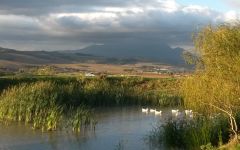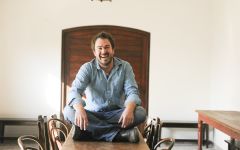Reyneke Capstone 2014
-
Wine
Spectator -
Robert
Parker



Product Details
Your Rating
Somm Note
Winemaker Notes
Professional Ratings
-
Wine Spectator
Alluring, with flavors of crushed plum and boysenberry preserves lined with singed vanilla, alder and black tea notes. Offers a polished feel, with the fruit and wood details in lockstep through the finish. Cabernet Sauvignon, Cabernet Franc and Merlot. Drink now through 2020.
-
Robert Parker's Wine Advocate
The 2014 Capstone (known as "Cornerstone" outside the USA) is a blend of 47% Cabernet Sauvignon, 9% Merlot and 44% Cabernet Franc, matured in a mixture and old and new barrels for 18 months (22 months for the Cabernet Sauvignon). It offers clean and pure aromas of blackberry, sage and cedar, a slight chalkiness that emerges with time. The palate is medium-bodied with grainy tannin, grippy in the mouth with tarry black fruit and quite a solid, slightly aloof finish. Maybe I would have liked a little more Merlot to add a little flesh on the finish?
Other Vintages
2013-
Robert
Parker -
Jeb
Dunnuck




In 1988, the Reyneke family bought the farm Uitzicht, a 90-acre farm on the ridge of the Polkadraai Hills, with spectacular views of Stellenbosch. Contemporaneously, Johan Reyneke began the lengthy process of the conversion from conventional farming to organic practices to a method of farming which was in accordance with biodynamic principles. Reyneke was the first farm in South Africa to achieve certification by Demeter International, the largest, and arguably, the most widely acknowledged biodynamic accreditation body in the world.
The farm produces several ranges of wines including Reserve, Biodynamic, Organic, and Vinehugger. They also produce a red blend named The Capstone with the proceeds of the wine helping the farm workers and their families.

One of the world’s most classic and popular styles of red wine, Bordeaux-inspired blends have spread from their homeland in France to nearly every corner of the New World. Typically based on either Cabernet Sauvignon or Merlot and supported by Cabernet Franc, Malbec and Petit Verdot, the best of these are densely hued, fragrant, full of fruit and boast a structure that begs for cellar time. Somm Secret—Blends from Bordeaux are generally earthier compared to those from the New World, which tend to be fruit-dominant.

With an important wine renaissance in full swing, impressive red and white bargains abound in South Africa. The country has a particularly long and rich history with winemaking, especially considering its status as part of the “New World.” In the mid-17th century, the lusciously sweet dessert wines of Constantia were highly prized by the European aristocracy. Since then, the South African wine industry has experienced some setbacks due to the phylloxera infestation of the late 1800s and political difficulties throughout the following century.
Today, however, South Africa is increasingly responsible for high-demand, high-quality wines—a blessing to put the country back on the international wine map. Wine production is mainly situated around Cape Town, where the climate is generally warm to hot. But the Benguela Current from Antarctica provides brisk ocean breezes necessary for steady ripening of grapes. Similarly, cooler, high-elevation vineyard sites throughout South Africa offer similar, favorable growing conditions.
South Africa’s wine zones are divided into region, then smaller districts and finally wards, but the country’s wine styles are differentiated more by grape variety than by region. Pinotage, a cross between Pinot Noir and Cinsault, is the country’s “signature” grape, responsible for red-fruit-driven, spicy, earthy reds. When Pinotage is blended with other red varieties, like Cabernet Sauvignon, Merlot, Syrah or Pinot Noir (all commonly vinified alone as well), it is often labeled as a “Cape Blend.” Chenin Blanc (locally known as “Steen”) dominates white wine production, with Chardonnay and Sauvignon Blanc following close behind.
